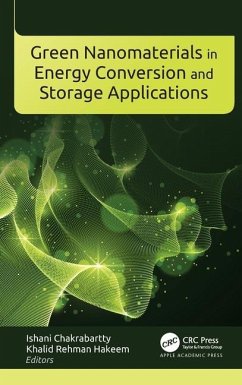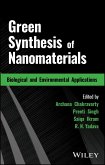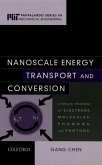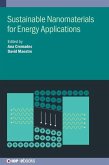Green Nanomaterials in Energy Conversion and Storage Applications
Herausgeber: Chakrabartty, Ishani; Hakeem, Khalid Rehman
Green Nanomaterials in Energy Conversion and Storage Applications
Herausgeber: Chakrabartty, Ishani; Hakeem, Khalid Rehman
- Gebundenes Buch
- Merkliste
- Auf die Merkliste
- Bewerten Bewerten
- Teilen
- Produkt teilen
- Produkterinnerung
- Produkterinnerung
Addresses the energy challenge by discussing the various aspects of design, exploitation, and applications of green nanomaterials in energy devices-for energy efficiency, energy conversion, energy storage, and energy saving. Also addresses the limitations that now exist and how green nanomaterials can be the utilized.
Andere Kunden interessierten sich auch für
![Nanomaterials for Energy Applications Nanomaterials for Energy Applications]() Nanomaterials for Energy Applications168,99 €
Nanomaterials for Energy Applications168,99 €![Advanced Nanomaterials and Their Applications Advanced Nanomaterials and Their Applications]() Advanced Nanomaterials and Their Applications133,99 €
Advanced Nanomaterials and Their Applications133,99 €![Green Synthesis of Nanomaterials Green Synthesis of Nanomaterials]() Green Synthesis of Nanomaterials205,99 €
Green Synthesis of Nanomaterials205,99 €![2D Nanomaterials for CO2 Conversion Into Chemicals and Fuels 2D Nanomaterials for CO2 Conversion Into Chemicals and Fuels]() 2D Nanomaterials for CO2 Conversion Into Chemicals and Fuels240,99 €
2D Nanomaterials for CO2 Conversion Into Chemicals and Fuels240,99 €![Applications of X-ray Techniques to Nanomaterials for Energy Research Applications of X-ray Techniques to Nanomaterials for Energy Research]() Applications of X-ray Techniques to Nanomaterials for Energy Research121,99 €
Applications of X-ray Techniques to Nanomaterials for Energy Research121,99 €![Nanoscale Energy Transport and Conversion Nanoscale Energy Transport and Conversion]() Gang ChenNanoscale Energy Transport and Conversion331,99 €
Gang ChenNanoscale Energy Transport and Conversion331,99 €![Sustainable Nanomaterials for Energy Applications Sustainable Nanomaterials for Energy Applications]() Sustainable Nanomaterials for Energy Applications145,99 €
Sustainable Nanomaterials for Energy Applications145,99 €-
-
-
Addresses the energy challenge by discussing the various aspects of design, exploitation, and applications of green nanomaterials in energy devices-for energy efficiency, energy conversion, energy storage, and energy saving. Also addresses the limitations that now exist and how green nanomaterials can be the utilized.
Produktdetails
- Produktdetails
- Verlag: Apple Academic Press Inc.
- Seitenzahl: 244
- Erscheinungstermin: 6. Februar 2024
- Abmessung: 229mm x 152mm
- Gewicht: 648g
- ISBN-13: 9781774913888
- ISBN-10: 1774913887
- Artikelnr.: 69482747
- Verlag: Apple Academic Press Inc.
- Seitenzahl: 244
- Erscheinungstermin: 6. Februar 2024
- Abmessung: 229mm x 152mm
- Gewicht: 648g
- ISBN-13: 9781774913888
- ISBN-10: 1774913887
- Artikelnr.: 69482747
Ishani Chakrabartty, PhD, is now working as Assistant Professor in the Department of Applied Biology, School of Biological Sciences, University of Science and Technology, Meghalaya (USTM), India. She has specialization in biotechnology, particularly in natural products, microbiology, and nanotechnology. She has been teaching graduate and postgraduate students for the past several years. She has published over ten publications in international journals (all Scopus- and WOS-indexed) as well as several chapters with national and international publishers like Springer, Elsevier, Taylor and Francis, Frontiers, and others. She was appointed as the Head of the Department in P.A. First Grade College, Mangalore University, India, where she served for a year. She has a number of national awards to her credit and holds life memberships in several organizations, including the Biotech Research Society, ECPFO, Indian Science Congress, etc. She was awarded Best Science Story in 2018 by AWSAR-DST, Govt. of India. Currently, she is collaborating with many scientists all over the world for a fruitful knowledge sharing and learning experience. Apart from being a researcher, Dr. Chakrabartty is also an avid writer on social issues in newspapers, magazines, and online forums. She completed her PhD at the Department of Biosciences and Bioengineering, IIT Guwahati, India, in 2019. Khalid Rehman Hakeem, PhD, is Professor at King Abdulaziz University, Jeddah, Saudi Arabia. After completing his doctorate (Botany; specialization in Plant Eco-physiology and Molecular Biology) from Jamia Hamdard, New Delhi, India, he worked as a lecturer at the University of Kashmir, Srinagar, India, for a short period. Later, he joined Universiti Putra Malaysia, Selangor, Malaysia, and worked there as a Postdoctorate Fellow and Fellow Researcher (Associate Professor) for several years. Dr. Hakeem has more than 10 years of teaching and research experience in plant eco-physiology, biotechnology and molecular biology, medicinal plant research, plant-microbe-soil interactions, as well as in environmental studies. He is the recipient of several fellowships at both national and international levels. He has served as a visiting scientist at Jinan University, Guangzhou, China. Currently, he is involved with a number of international research projects with different government organizations. To date, Dr. Hakeem has authored and edited more than 35 books with international publishers, including Springer Nature, Academic Press (Elsevier), and CRC Press. He also has to his credit more than 80 research publications in peer-reviewed international journals and 55 book chapters in edited volumes with international publishers. At present, Dr. Hakeem serves as an editorial board member and reviewer for several high-impact international scientific journals from Elsevier, Springer Nature, Taylor and Francis, Cambridge, and John Wiley Publishers. He is included in the advisory board of Cambridge Scholars Publishing, UK. He is also a fellow of Plantae group of the American Society of Plant Biologists, member of the World Academy of Sciences, member of the International Society for Development and Sustainability, Japan, and member of the Asian Federation of Biotechnology, Korea. Currently, Dr. Hakeem is engaged in studying the plant processes at eco-physiological as well as molecular levels.
1. An Introduction to Nanomaterials in Energy Applications 2. Green
Nanomaterials: Importance and Applications 3. Global Energy Crisis: Need
for Energy Conversion and Storage 4. Energy Conversion and Storage Devices
5. MOF-Based Nanomaterials as Electrocatalysts for Energy Applications 6.
Cellulose-Based Nanomaterials in Energy Conversion/Storage Devices 7.
Recent Advances in Nanomaterials for Energy Conversion and Storage 8.
Thermal Conductivity of Green Nanomaterials: A Special Reference to
Nanofluids 9. Green Nanotechnology for a Sustainable Future 10. Green
Nanomaterials for a Sustainable Future Environment
Nanomaterials: Importance and Applications 3. Global Energy Crisis: Need
for Energy Conversion and Storage 4. Energy Conversion and Storage Devices
5. MOF-Based Nanomaterials as Electrocatalysts for Energy Applications 6.
Cellulose-Based Nanomaterials in Energy Conversion/Storage Devices 7.
Recent Advances in Nanomaterials for Energy Conversion and Storage 8.
Thermal Conductivity of Green Nanomaterials: A Special Reference to
Nanofluids 9. Green Nanotechnology for a Sustainable Future 10. Green
Nanomaterials for a Sustainable Future Environment
1. An Introduction to Nanomaterials in Energy Applications 2. Green
Nanomaterials: Importance and Applications 3. Global Energy Crisis: Need
for Energy Conversion and Storage 4. Energy Conversion and Storage Devices
5. MOF-Based Nanomaterials as Electrocatalysts for Energy Applications 6.
Cellulose-Based Nanomaterials in Energy Conversion/Storage Devices 7.
Recent Advances in Nanomaterials for Energy Conversion and Storage 8.
Thermal Conductivity of Green Nanomaterials: A Special Reference to
Nanofluids 9. Green Nanotechnology for a Sustainable Future 10. Green
Nanomaterials for a Sustainable Future Environment
Nanomaterials: Importance and Applications 3. Global Energy Crisis: Need
for Energy Conversion and Storage 4. Energy Conversion and Storage Devices
5. MOF-Based Nanomaterials as Electrocatalysts for Energy Applications 6.
Cellulose-Based Nanomaterials in Energy Conversion/Storage Devices 7.
Recent Advances in Nanomaterials for Energy Conversion and Storage 8.
Thermal Conductivity of Green Nanomaterials: A Special Reference to
Nanofluids 9. Green Nanotechnology for a Sustainable Future 10. Green
Nanomaterials for a Sustainable Future Environment








